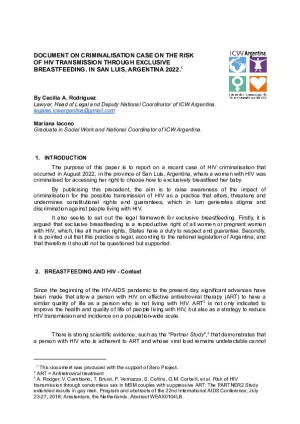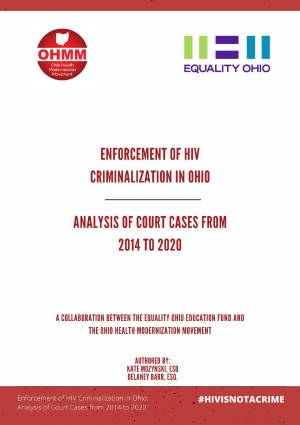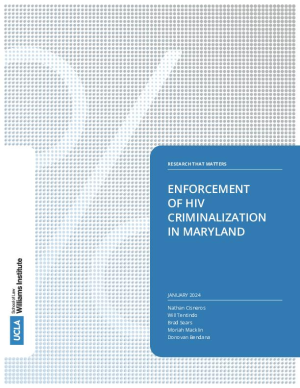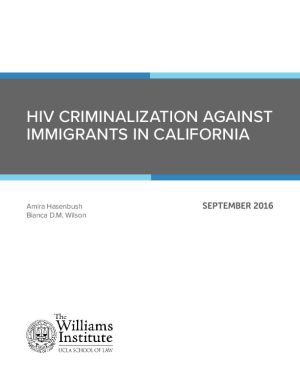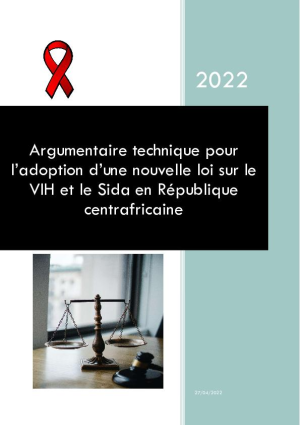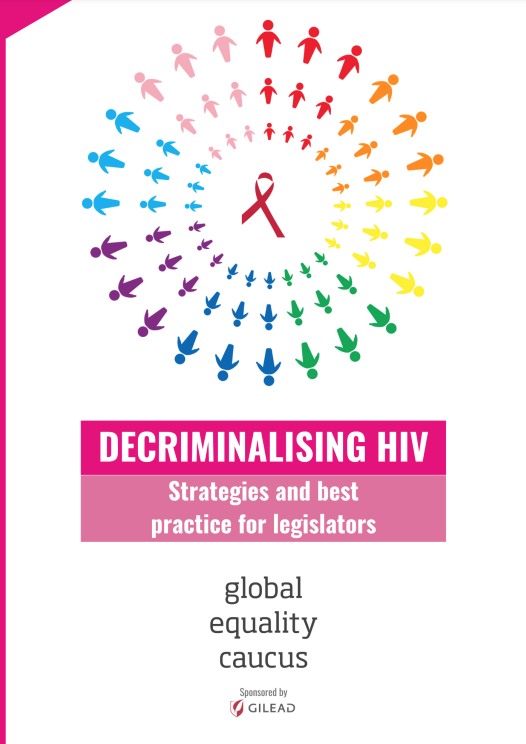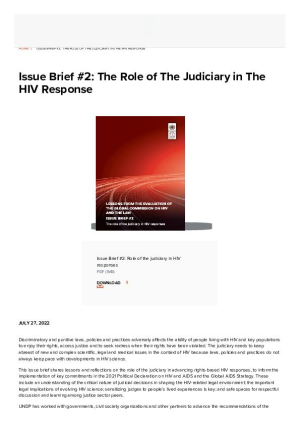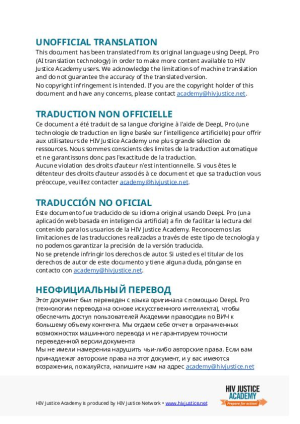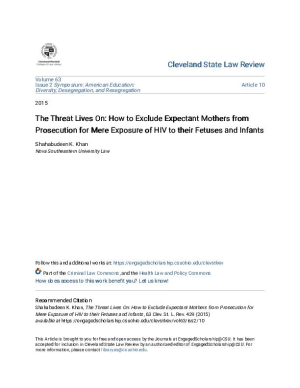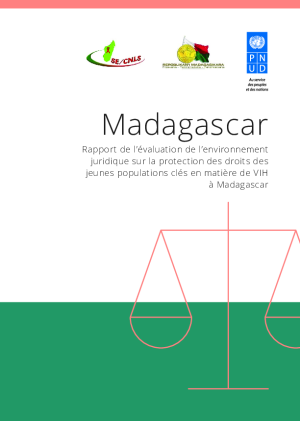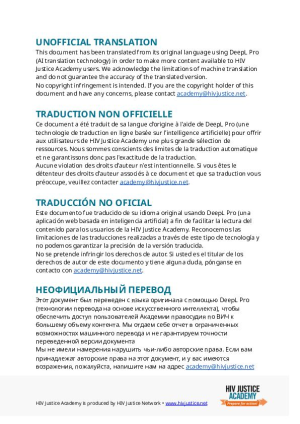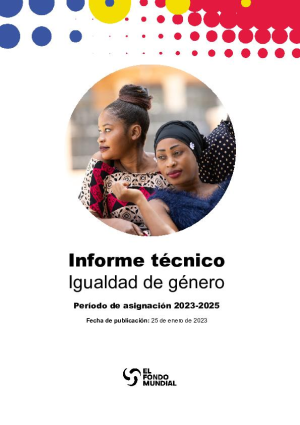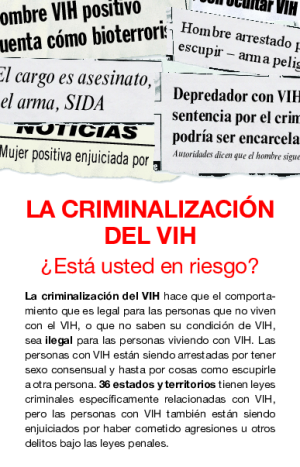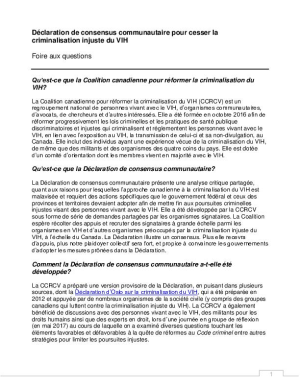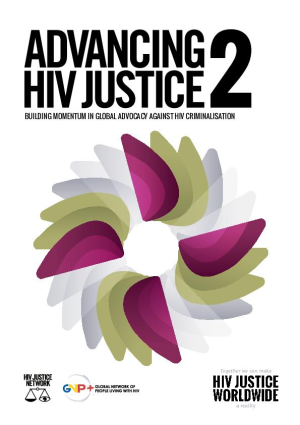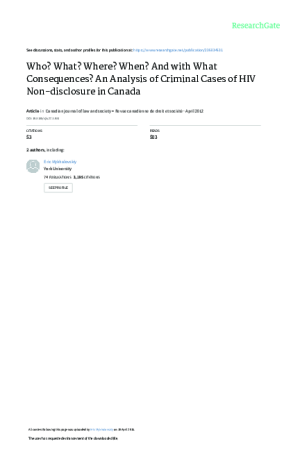Document on criminalisation case on the risk of HIV transmission through exclusive breastfeeding
The purpose of this paper is to report on a recent case of HIV criminalisation that occurred in August 2022, in the province of San Luis, Argentina, where a woman with HIV was criminalised for accessing her right to choose how to exclusively breastfeed her baby.
Please note this is a DEEPL translation of the Spanish report.
Enforcement of HIV Criminalisation in Ohio – Analysis of court cases from 2014 to 2020
Equality Ohio Education Fund (EOEF) and the Ohio Health Modernization Movement (OHMM) collaborated for over three years to for the first time gather data across all 88 counties in Ohio about the use of HIV Criminalisation laws and the consequences of HIV criminalization across Ohio. This effort, which is the first of its kind in Ohio, catalogs the criminal cases charged in Ohio from 2014-2020 under any of Ohio’s six statutes that criminalize or create penalty enhancements for people living with HIV.
Enforcement of HIV Criminalization in Maryland
Using data obtained from the Maryland State Administrative Office of the Courts, this study from The Williams Institute examines the enforcement of HIV criminalization laws in Maryland.
Highlights:
- Nearly two-thirds of U.S. states and territories have laws that criminalize people living with HIV.
- Black people, especially Black men, are overrepresented in HIV-related crimes in Maryland.
- Over two-thirds of people charged with HIV-related crimes were charged in Baltimore City, Montgomery County, or Prince George's County.
HIV Criminalization Against Immigrants in California
The Williams Institute researchers analyzed California Criminal Offender Record Information (CORI) data on HIV offenses in California to explore the demographics and experiences of foreign born individuals as compared to their U.S. born counterparts. While only 30% of immigrants in this data set had immigration proceedings recorded in their criminal history, among them, one in four had those proceedings initiated after and HIV-specific incident. This emphasizes the impact that HIV criminalization can have on the lives of noncitizen immigrants above and beyond the impact on their citizen peers.
Argumentaire technique pour l’adoption d’une nouvelle loi sur le VIH et le Sida en République centrafricaine
Le présent mémorandum est un outil technique de plaidoyer élaboré à l’intention des députés Centrafricains appelés à passer en revue, discuter et débattre sur le projet d’adoption d’une nouvelle loi sur le VIH en remplacement de la loi n° 06.030 du 12 Septembre 2006 fixant les droits et obligations des personnes vivant avec le VIH et le SIDA. Cet argumentaire a été absolument instrumental dans le processus - que ce soit au niveau de la sensibilisation des parlementaires que de la préparation du gouvernement et de la société civile.
Redefining Risk: Judicially Heightened Risk Standards and HIV-Specific Criminal Laws
This Note explains the risk of HIV transmission associated with certain behaviours, lays out variations in HIV-specific criminal laws, and examines how those laws are applied. It also examines the courts’ reasoning in Rhoades and Hogg as well as analyzes the legal and policy problems that these laws create, the challenges to amending or repealing the laws.
Decriminalising HIV: Strategies and best practice for legislators
This report from the Global Equality Caucus collates expert insight and best practice examples on HIV criminal law reform. In a series of case studies from around the world, where some of the Global Equality Caucus’s members have led reform efforts, the report identifies several key lessons, takeaways and overarching themes for legislators to consider.
Issue Brief #2: The Role of The Judiciary in The HIV Response
This issue brief shares lessons and reflections on the role of the judiciary in advancing rights-based HIV responses, to inform the implementation of key commitments in the 2021 Political Declaration on HIV and AIDS and the Global AIDS Strategy. These include an understanding of the critical nature of judicial decisions in shaping the HIV-related legal environment; the important legal implications of evolving HIV science; sensitizing judges to people’s lived experiences is key; and safe spaces for respectful discussion and learning among justice sector peers.
OptTEST Fiche conseil 11 – Questions clés : Les questions que vous devez vous poser (et auxquelles vous devez pouvoir répondre) avant de demander à rencontrer un ministre du gouvernement
Document expliquant comment préparer une réunion avec des représentants du gouvernement.
Ce document a été traduit de sa langue d'origine à l'aide de DeepL Pro (une technologie de traduction en ligne basée sur l’intelligence artificielle) pour offrir aux utilisateurs de HIV Justice Academy une plus grande sélection de ressources. Nous sommes conscients des limites de la traduction automatique et ne garantissons donc pas l'exactitude de la traduction.
The Threat Lives On: How to Exclude Expectant Mothers from Prosecution for Mere Exposure of HIV to their Fetuses and Infants (2015)
This article articulates how the threat of prosecution of mothers living with HIV who expose or transfer the virus to their foetuses or newborn will discourage and scare women away from seeking proper medical treatment instead of encouraging HIV treatment and prevention. It also explores how HIV-specific criminal transmission laws in the United States could hamper and stifle the progress in prevention and treatment of vertical transmission. It concludes by proposing a model for change in addressing these HIV-specific criminal transmission statutes.
- Alternative links
- Traduction française automatisée
Rapport de l’évaluation de l’environnement juridique sur la protection des droits des jeunes populations clés en matière de VIH à Madagascar
Sur la base d’une analyse de la situation, le rapport d’évaluation de l’environnement légal et juridique en matière de réponse au sida présente des recommandations pratiques pour améliorer les résultats dans la riposte. Elles sont articulées autour de la définition des responsabilités institutionnelles des pouvoirs publics, la mise en œuvre des services d’appui et de réformes législatives ainsi que la promotion d’un environnement incitatif pour les populations clés et les personnes infectées et affectées.
Le système est défaillant – Audit des lois australiennes sur le dépistage obligatoire
L'audit, mené par Sally Cameron, analyste politique senior du HIV Justice Network, au nom du HJN et de la National Association of People with HIV Australia (NAPWHA), révèle que les lois sur le dépistage obligatoire sont en contradiction avec la politique nationale de dépistage du VIH et fonctionnent en dehors des réponses structurées et très réussies au VIH gérées par les cliniciens et les départements de la santé. L'audit a révélé que dans de nombreux cas, les lois, leur mise en œuvre et leur suivi comportent de nombreuses défaillances structurelles, qui se produisent généralement dans plusieurs États.
Ce document a été traduit de sa langue d'origine à l'aide de DeepL Pro (une technologie de traduction en ligne basée sur l’intelligence artificielle) pour offrir aux utilisateurs de HIV Justice Academy une plus grande sélection de ressources. Nous sommes conscients des limites de la traduction automatique et ne garantissons donc pas l'exactitude de la traduction.
- Alternative links
- English
Informe técnico VIH, derechos humanos e igualdad de género
El objetivo del presente informe técnico es ayudar a los solicitantes del Fondo Mundial a incluir y ampliar programas concretos y efectivos dirigidos a eliminar los obstáculos relacionados con los derechos humanos en los servicios de prevención, diagnóstico y tratamiento del VIH. El informe explora los obstáculos en el acceso y la utilización de los servicios del VIH que estos programas ayudan a eliminar, incluida la penalización del VIH.
La criminalización del VIH – ¿Está usted en riesgo?
Esta tarjeta informativa del Projecto de Justicia Positiva (2013) explica qué hacer en caso de detención.
Déclaration de consensus communautaire pour cesser la criminalisation injuste du VIH – Foire aux questions
Explique ce qu'est la Déclaration de consensus communautaire et comment elle a-été développée.
Advancing HIV Justice 2: Building momentum in global advocacy against HIV criminalisation
Provides a progress report of achievements and challenges in global advocacy against HIV criminalisation from April 2013 to 30 September 2015.
- Alternative links
- Français (Traduction automatisée),
Who? What? Where? When? And with what consequences?: An analysis of criminal cases of HIV non-disclosure in Canada
Explores the evolution of the criminalization of HIV non-disclosure in Canada, focusing on “criminalization creep”: increasing numbers of people being charged with increasingly severe crimes.
Canadian Consensus Statement on HIV and its transmission in the context of the criminal law
Sets out in clear, concise, and understandable terms a collective expert opinion about HIV sexual transmission, transmission associated with biting and spitting, and HIV as a chronic manageable condition. Authored by six distinguished Canadian HIV clinicians and scientists.
- Alternative links
- French

